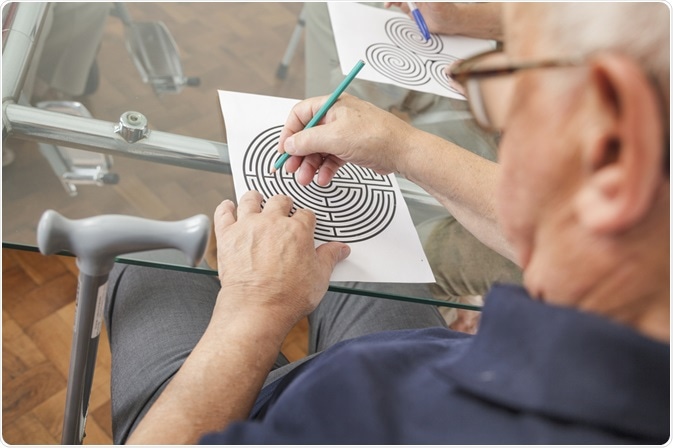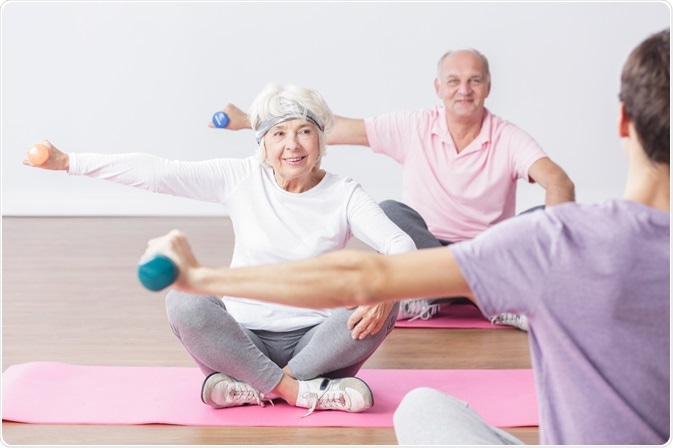As people age, many of our cognitive abilities start to slowly decline. Specific interventions such as keeping socially, mentally, and physically active in addition to adopting correct dietary changes can slow down cognitive decline in elderly individuals.

Image Credit: Dan Kosmayer/Shutterstock.com
Cognitive Decline as a Part of Ageing
As we age, many of our cognitive abilities start to decline. These include impairments to short term working memory, processing speed, retrieval of memories/information, attention, and problem-solving.
Subtle and gradual decline as you age is a part of the normal aging process. However, more rapid and progressive cognitive decline is usually indicative of dementia – which is not a part of healthy aging.
Often, there are many modifiable risk factors implicated in dementia onset and modulating these could potentially slow down cognitive decline, or even prevent it completely. In healthy elderly people, specific tasks can be performed, and actions are taken to slow down cognitive decline, and in some cases, potentially even improve them.
It has been shown that people who work with cognitively stimulating occupations (e.g. teachers, physicians, musicians, pilots, etc) or with a higher level of education (e.g. academics) often maintain a higher level of cognitive ability in later life.
Having a higher level of education can have protective effects on memory (in the form of crystallized intelligence) as well as some protection on processing speed and abilities (fluid cognition).
It is important to note that even in those with higher education and cognitively stimulating occupations, eventually, with advanced age cognitive abilities do also begin to slowly decline but much slower compared to those with lower education attainment and cognitively stimulating jobs.
Some research has also indicated that socioeconomic status and prior life experiences can also heavily influence cognitive performance in old age.
Irrespective of prior life experience, educational attainment, cognitively demanding occupations and socioeconomic status, there are many ways that cognitive ability could be stabilized or even improved in older individuals.
Improving Cognitive Abilities in Older People
Social/Leisure Activities & Brain Training Games
Elderly adults who regularly engage socially with other people; either through support groups, church groups, and supportive roles in schools, for example, can successfully maintain and improve cognitive and mental wellbeing.
Being socially active also requires increased motivation to do so, moderate physical activity – all which have beneficial outcomes for cognitive health in older adults.
Specific cognitively demanding leisure activities or games, such as chess or bridge, require the use of one's working memory and executive reasoning skills.
Consequently, older individuals who play chess or bridge more often tend to have better working memories and reasoning skills compared to those that do not. Other self-played games such as crosswords or sudoku also maintain a higher cognitive ability.
Memory training can also lead to improvements In concentration and attention, relaxation, personal insight and motivation in addition to cognitive ability, and thus such activities may not only enhance cognitive ability but also other behavioral outcomes that also lead to significant improvements in one's quality of life and mental wellbeing (i.e. reduced depression scores).
Physical Activity
Physical activity increases bodily blood flow and oxygen levels including to the brain as well. Some studies have shown that those that simply walked more blocks were less likely to demonstrate declines in cognition 5-10 years later on, with those with the highest levels of physical activity having a 20% risk reduction for cognitive decline and dementia.

Image Credit: Photographee.eu/Shutterstock.com
Even spending less time sitting can offset some of the effects of a sedentary lifestyle e.g. light activity such as brisk walking, gardening, or dancing.
A study published in the International Journal of Behavioural Nutrition and Physical Activity found that physical activity programs for older adults, combined with cognitively stimulation exercises (like brain training games) can lead to significant improvements to overall cognitive health and mental wellbeing, and as a possible treatment for cognitive decline in older individuals.
The findings suggest that performing physical activity in combination with cognitively demanding tasks was much better in improving cognition that by segmenting physical activity and cognitive training sessions.
Nutrition/Diet
Nutrition and diet in younger or mid-aged individuals have been shown to have a profound effect on cognitive ability later in life.
This includes the consumption of the ‘Mediterranean diet’ comprising of fresh fruits, vegetables, fish (omega 3), with very little red meat and refined carbohydrates/grains and sugar. Diets such as these are rich in nutrients, vitamins, and minerals and confer neuroprotective effects.
Concerning older adults, studies have shown the beneficial link between antioxidant/vitamin supplements prescribed to patients with hypertension and diabetes, to overall cognitive health.
For example, vitamins B6 and B12 can reduce the levels of homocysteine – a vascular disease marker implicated in cognitive decline and dementia.
Vitamins C and E (both antioxidants) can reduce the levels of vascular inflammation and could be used to reduce the rates of cognitive decline, especially in intermediate memory.
In summary, several studies have shown the beneficial effects of moderate physical activity (such as walking or gardening), performing cognitively stimulating tasks (such as playing chess or doing crosswords), being socially active and consuming a balanced healthy nutritious diet have on preserving and even improving cognitive abilities in older adults.
Adopting these from early on and with increased frequency is especially beneficial in the slowing of cognitive decline in otherwise healthy older adults. Special considerations to adopt such measures should be made by caregivers, therapists, nurses, and the community.
Sources:
- Williams & Kemper, 2010. Interventions to Reduce Cognitive Decline in Aging. Journal of Psychosocial Nursing and Mental Health Services. 48(5):42-51 https://www.ncbi.nlm.nih.gov/pubmed/20415290
- Steyvers et al, 2019. A large-scale analysis of task-switching practice effects across the lifespan. Proceedings of the National Academy of Sciences of the USA (PNAS) 116(36):17735-17740 https://www.ncbi.nlm.nih.gov/pubmed/31427513
- Gheysen et al, 2018. Physical activity to improve cognition in older adults: can physical activity programs enriched with cognitive challenges enhance the effects? A systematic review and meta-analysis. International Journal of Behavioural Nutrition and Physical Activity 15(1):63 https://www.ncbi.nlm.nih.gov/pubmed/29973193
Further Reading
Last Updated: Apr 28, 2020